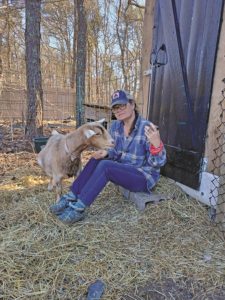Buttercup was not born in our back yard, but she was the kid that made me a goat mama. She and her sister came to us from another small farm when we were novice goatherds. She was three months old, curious and kind from the start. If we are allowed to admit to favorites, Buttercup soon became mine.
Later, I learned that our animal friends also sometimes mother us. A year after Buttercup came into our lives, I was diagnosed with breast cancer. During many of my darkest times I sat with our goats. Their silly faces made me laugh even when laughter was the last thing on my mind. And when I cried, Buttercup nuzzled my ear with her soft nose and tried to eat my clothes. The smell of hay on her fur felt comforting in the way only the simplest things in life can.
Being with farm animals, companions to humans for centuries, whose milk and meat fed our forefathers as they feed us, reminded me that life goes on beyond our time on Earth.
Buttercup was the first doe to give birth on our backyard farm. On a sunny late spring day in 2020, she lay down in the hay and, within minutes, twins were born. I barely made it to her side in time, and she barely needed me there. Our two other pregnant does had harder births, waking me in the night with their labor struggles, but Buttercup was a natural.
The second time around, though, as I’ve written here before, things didn’t go so well. First, Buttercup didn’t go into labor when we expected her to. Back then, Lance Romance lived on the farm — theirs was not a drive-by affair — so we couldn’t be exactly sure of her due date, but I was worried. I checked on her day and night, sitting next to her, stroking her fur. Buttercup was my goat baby once again. This time it was she who was not feeling well and needed care and comforting.
Then, suddenly, Buttercup was in distress. The first kid was not positioned right, and the vet couldn’t get to us in time. That day, I didn’t know if she or the babies would make it. But we did it together, Buttercup and I. Reaching in, I was able to help deliver three kids, and although the first one did not survive, the other two, both big, healthy boys, did.

We noticed after this birth, though, that Buttercup had changed. She didn’t seem as happy, even around her kids. She had healed well from the birth, but something wasn’t quite right.
Buttercup did not want Lance Romance near her. Lance by that time was a wether — we loved him, but bucks smell terrible. Even without his reproductive powers, Lance was still a romancer. His attentions on Buttercup continued. Before the birth she didn’t mind, but now things were clearly different.
Buttercup also seemed to avoid the side of our paddock where she had given birth. I did some research and learned that animals can experience post-traumatic stress and will, for example, avoid locations where past trauma occurred. We found a remedy by accident. We had agreed to temporarily foster another doe, Molly, who was actually Buttercup’s sister. Buttercup was evidently cheered by Molly’s presence and the two often kept to Buttercup’s end of the paddock together.
Not long after we took Molly in, another farmer told us that Buttercup might be happier in a herd of does. That’s the traditional set up at dairy farms, where, even though wethers and does can mingle happily, keeping a wether as a sort of pet is just not considered practical.
Then we heard that someone in Brewster was looking for two does. She would offer a home for Molly and Buttercup. The circle of Cape Cod goat farmers is small.
Heather Pooler grew up on the South Shore. “My grandparents had a small dairy farm, and kept pigs and chickens, too,” she told us. Now living in Brewster on her own small farm, she said she had always wanted to add goats — not for breeding, but for company.
There are many hellos and goodbyes in farm life. But could I let Buttercup go? I thought of the Old Testament story of the Judgment of Solomon. In that tale, a true mother gives up her child to protect him. Sitting with my beloved Buttercup, I felt she understood. She trotted easily after Russell when he led her to the truck.
Heather spends a lot of time with Buttercup, who, she says, loves to be petted and scratched. “If I stop, she pushes her forehead into me, asking for more,” Heather says, “I believe she is happy.”



